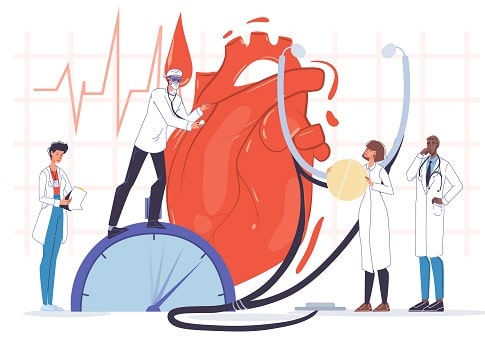SARS-COV-2, more commonly known as COVID-19, is a highly infectious coronavirus that is typically viewed as a respiratory disease. While it is true that the disease is primarily transmitted via the respiratory system, there is strong evidence that it attacks organs other than the lungs, including the heart.
A recent German study revealed that COVID-19 survivors, including those who didn’t need hospitalization, may suffer long-term heart damage. After taking cardiac MRIs of 100 COVID-19 survivors and comparing them to those of people with no infection history, researchers were able to show that two months after recovery, the hearts of 78 of the infected patients were structurally changed. Of these, 76 had cardiac scarring, similar to that caused by a heart attack.
Another study, which involved an autopsy of 39 people who died from COVID-19, revealed high virus levels in the heart of 24 of the deceased. If COVID-19 is a respiratory illness, why is it having such an impact on cardiac health?
COVID Impact on Heart Health
There’s increasing evidence that contracting COVID-19 could be the beginning of heart failure for many patients, and that cardiac emergencies could be a significant cause of COVID-related deaths. For survivors, whether the damage to the heart’s long-term functioning is permanently impaired from having contracted the disease remains to be seen.
Nonetheless, it is clear that before catching COVID-19, people with underlying heart issues, such as coronary artery disease or high blood pressure, are highly likely to experience a cardiac emergency while infected, and are at greater risk of dying.
This reality has exacerbated existing disparities in health outcomes for minority communities. For example, African Americans and Latinx historically have higher rates of underlying health conditions, such as diabetes and heart disease, which in turn have led to significantly higher COVID-19 fatalities in minority communities, especially in the United States.
The worry now is that many people may have developed cardiac health complications as the result of COVID-19, whether they realize it or not. Thus, they may have to spend the rest of their lives managing heart disease, and be at greater risk of suffering a cardiac emergency, such as a heart attack or stroke.
 How Does the Virus Cause Cardiac Damage?
How Does the Virus Cause Cardiac Damage?
There are several ways that COVID-19 can cause heart injury. First, as we’ve already mentioned, COVID-19 is more devastating to individuals with pre-existing cardiac complications, such as the h’s and t’s. This is similar to how other respiratory illnesses, such as influenza, can trigger heart attacks.
Second, the virus can exacerbate the symptoms of people with mild heart disease. For example, people with low-level heart vessel blockages may have inflammation, and fever-induced blood clots worsen their condition. Complications can also make it harder for the body to dissolve clots. These combined effects can place additional stress on the heart.
Third, COVID-19 impedes breathing, which can cause insufficient oxygen reaching the heart muscles. Reduced oxygen intake, combined with an accelerated heart rate, will lead to the body demanding more oxygen than the patient can deliver. Also, COVID-19 infected lungs cannot effectively exchange carbon-dioxide and oxygen, which worsens the problem.
Lastly, the virus causes fulminant inflammation of the heart muscles in some patients. The inflammation will disrupt heart rhythm, cause cardiac muscle damage, and disrupt the heart’s blood pumping capabilities. Though it is worth noting, there are few recorded cases of such complications, but they nonetheless exist.
If you’re a medical professional on the front line of the battle against COVID-19, be sure to renew your ACLS or PALS certification so you can be ready to respond to any cardiac emergencies that may arise.
Cardiac Complications and COVID-19 Statistics
The American College of Cardiology (ACC) released the following data to highlight the relationship between COVID-19 and heart disease. The data is from early 2020 Chinese case reports:
- 7% of patients experienced arrhythmia
- 40% of COVID-19 patients have cerebrovascular or cardiovascular disease
- 2% of patients suffered an acute cardiac injury
- Some COVID-19 patients develop myocarditis
- Patients with preexisting cardiovascular disease have the highest fatality rate (10.5%), followed closely by diabetes (7.3%)
Clearly, even in the earliest days of the virus, there was a strong correlation between cardiovascular complications and hospitalization related to COVID-19.
Can Medication Save the Day?
Currently, there are no surefire treatments for COVID-19. There is still debate surrounding the effectiveness of hydroxychloroquine, chloroquine, and azithromycin, but several reports already indicate that using these drugs can contribute to other heart complications.
Studies indicate that hydroxychloroquine and azithromycin can cause QT prolongation in COVID-19 patients. QT prolongation is when the heart muscle takes longer to recharge between beats, which can lead to life-threatening arrhythmias.
Using blood pressure medication to protect those with preexisting heart disease is also not looking promising. That’s because the virus attacks human cells by anchoring to ACE2 receptors on the surface of cells in the heart, kidneys, airways, lungs, and blood vessels.
Many blood pressure drugs increase ACE2 receptor numbers found on cells. Some researchers believe that having more ACE2 receptors will make the virus spread faster throughout the body, worsening the situation.
Other experts believe that increasing ACE2 receptors may strengthen cardiovascular function and make the body less susceptible to infection. For now, the evidence regarding which theory is correct is inconclusive. Until a vaccine or a more reliable treatment comes along, people are better off adhering to preventative measures, especially if they have pre-existing heart disease.
















